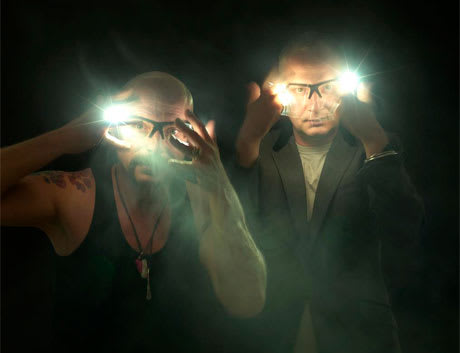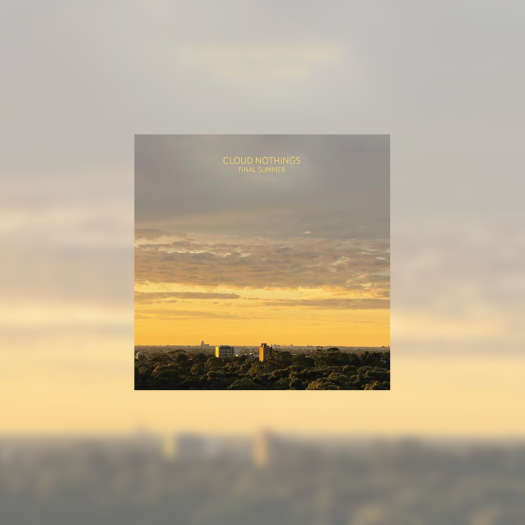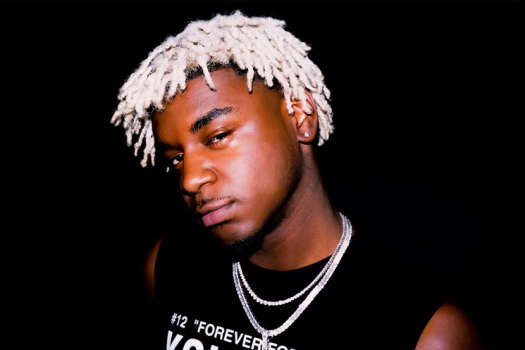It may not always be perfect, but family is always family. Taking eight years between albums, with a half-dozen years of time off and solo projects in between, the electronic dance duo of brothers Phil and Paul Hartnoll defied the odds in 2012 by releasing Wonky. Their eighth studio album as Orbital, Wonky debuted at #22 on the UK Top 100 and stayed ranked for three weeks, making it their best chart performance since their sprawling double album The Altogether from 2001. Considering all their success, which included three albums cracking the Top 10, generation-defining soundtrack work, and even some chart activity in the U.S., they had nothing left to prove, yet their integrity and humility compelled them to move beyond the shadow of their former selves and push to create new works for a generation of young ravers born after "Chime" launched the duo into public consciousness in the late '80s.
The Glastonbury Festival gig in 1994 was big for you, playing to thousands of people, but tonight you're playing 560 in Vancouver to a couple hundred. Do you find you prefer big festival shows, or more intimate club gigs?
Phil: They're all different. The main thing for me is connection with the audience, no matter how big or small it is. I don't care where I am or who I'm playing to, as long as you can feel the energy and people are enjoying it at the time, that's as much as I ask for. Outdoor festivals are different. This is going to be intense tonight, which is great.
Paul: I'd rather do small, packed, sweaty gig than a nice big half empty one with no vibe. It's about the vibe. You play to the size of the venue, to the demand of the territory you're in.
Unlike most popular electronic acts, you incorporate a lot of live improvisation into your sets. Does that change depending on the gig? Do you take more chances in a smaller venue?
Paul: No, not really. I think you can get away with more fine small detail in a smaller venue 'cause things are a lot sharper in sound. Details are heard more. If you're doing big outside festivals and stadium sized things, the details tend to get lost in the reverb of the room a bit. You tend to do bigger brush strokes in bigger gigs. So in a way, you can get more intimate with your performance in a small venue.
How do your live performances affect your studio albums, considering the progression of "Satan" from the eponymous 1991 debut to "Beelzedub" as it appears on Wonky?
Phil: Yeah, that's a really good example of how things have developed live, with "Satan" particularly, 'cause we twist and turn it as you've going along over the years.
Paul: It ended up with sort of a drum and bass ending, 'cause we were bored of playing it the same way when we were touring before this album [Wonky]. And then, when we were writing this album, we were doing a bit of DJing, and we though, what should we do? What are we going to DJ with? Let's start with a version of "Satan" that we can play live. We thought, let's put the drum and bass ending on it, and that got us to thinking, let's put a dubstep beginning, 'cause then, instead of changing tempos, it's a nice half-step. That's how things develop. At the moment, I'm trying to work in a 6/8 not-dubstep version of "Doctor?" just for a laugh. We've started playing "Doctor?" again. It's good fun trying stuff out. I'm messing around with something now. I'll try it tonight. It may fail, it may work, it might be something we keep in the set for ages, but I'm trying to do a topical version with current sounds that I hear DJs playing, from playing Nocturnal Wonderland the other day with all these young DJs playing tons of dubstep, I was listening to that and thinking, "Oh, it would be funny to do that to 'Doctor?' Let's give it a try."
Phil: It's also the 6/8 thing. "Doctor Who" was an original 6/8 time signature, and there's a lot of modern tracks now that flip into that, which is quite an interesting little twist on typical 4/4.
What are you digging these days?
Paul: I can't say there's much that I'm particularly enjoying that's new and fresh. Most of the bands I would listen to electronically have been around for a while, like Plaid, Trent Reznor, always keeping an eye on him, The Knife... Dance music, I can't honestly say I'm particularly into much dance music. I think a lot of it is nearly good. I get encouraged. I listen to these young guys DJing this soup of dubstep and... I don't know, they call it brostep? You know, really aggressive... I find it amusing. I quite enjoy some of the sounds, hence I'm going to incorporate some of that into "Doctor?" tonight for a laugh. See how it works, our version of that kinda thing. It's good fun. I can't say there are any particular styles or bands that I would go, "I love that single. That track's great." Nothing, really. Maybe I'm just not listening to the right stuff.
Phil: I DJ. I play stuff from all over the years, and new stuff. Claude VonStroke pops up all the time, but he's another old fave. He's a great producer, quite consistent.
Paul: I'm looking forward to Nathan Fake's new album.
Phil: Yeah, we've got him touring with us in December, a UK tour.
Your first few albums, there was a bit more experimentation, like the Steve Reich-style phasing on "Time Becomes" and "Input Out" from the brown album. As you're using more things like Ableton Live, do you think you might return to experimental music at some point, like generative compositions?
Paul: Experiments are experiments. They either work or they don't. If I listen to those albums, I smile and see a naive person making noise that gets on my nerves when I listen to the album. I don't dislike it, don't get me wrong, but I won't do that again. I tried it, and I enjoyed it.
Phil: I suppose you go through phases. When you're younger, around that time you discover Steve Reich and that sort of thing, and you muck about with that. You tend to have done that, got it out of your system.
Paul: I think a lot of it has to do with dope smoking, as well. Steve Reich is a dopey kind of thing, listening to that. I'm sure he wouldn't see it that way. I think, though, you do a bit of film scoring, and you get put in those areas, the more unusual, experimental stuff.
Phil: Yeah, we just did a film soundtrack, a film called Pusher, which is a remake of, um...
Paul: ... a film called Pusher, a Dutch film. No, a Danish film.
Phil: Yeah, the guy that did Drive, his first film. A British production company just did an English version of it, a week in the life of a drug dealer all goes pear-shaped. He gets more and more into trouble as the week goes on. It's pretty grim in some respects. You get a chance to go off the rails a little bit with the music.
Paul: It's not conventional music, film music. It requires a different approach.
'Cause then you're working around someone else's art, their demands.
Phil: That ends up being more experimental, like with the slowing down of the breakbeat stuff. Slowing it down, such miniscule time stretching and things like that... like Paul was saying, you get it out of your system when you're doing things like that, and we don't need to put it into Orbital.
You've mentioned before that you weren't super happy about your last two albums, The Altogether and The Blue Album, but there's a wonderful, upbeat consistency in the new album, except for the rather scary "Beelzedub." How do you feel about that?
Phil: When we stopped, we stopped for a reason. We stopped because we weren't feeling it any more, even though we were in a great position, in a band. We were creatively drained doing this Orbital machine, and so we chucked the baby out with the bath water, but really believed that was it. 'Cause we weren't feeling it... well, fuck it, let's go do something else, and so we did that. And now, this time around, after getting back together for the reunion gig that Big Chill asked us into, and doing a year and a half of reunion gigs, and that going so well. The vibe that we got off the audiences, the encouragement, and us really enjoying that... it's like, "Let's continue this." That's how Wonky came about. It does seem to me like we've gone back to, when we were writing it, the way it was. It's gone back to like when we first started, but with all that experience under our belt. It does seem a lot freer, certainly compared to when we left it.
Paul: It's very free. In the past, we might have been writing our version of dance music, whereas this time around, we're writing our version of what Orbital'd play live, which is brilliant 'cause that's exactly what we were doing. We'd done two years of that, playing all our old tracks, and refreshed ourselves as to what it was that we thought was good about what we did or not, and then took that idea into the studio and said, "Right, let's make an album of stuff we want to play live." Nothing to do apart from please ourselves. We knew when it was working because we just knew, "Yeah, I want to play that live. That'll be exciting to play live." That's how this album developed. That's quite innocent, really.
You've talked about the favourite gear you own, like the Macbeth M5N and the Oberheim Xpander. What's on your wish list?
Paul: I've just bought an EMS Putney. It's the original British synthesizer from 1969. I bought a Mark One off the original guy that was making them. It's like the ultimate guitar for synthesist people. It's such a warm, soft electronic sound. It sounds like the '50s and '60s, rather than now or even the '70s. It's what the Radiophonic Workshop used... They had a thing called the Delaware, which is a Synthi 100. I know two people that own them, which is really annoying. A Synthi 100, that's like the super version of what I just got. A Waldorf Wave, I'd love one of those. Wouldn't mind a Prophet 5, that's small fry. A CS80! I've got serious foam-mouth from talking to Tom Squarepusher the other week, and he bought a CS80. He said, "Oh, yeah, you should come up and play on it. I'm kind of fed up with mine now. Have a borrow of it. Buy it off me if you like it." I'm like, don't fucking tempt me. Maybe if you ask me in a year, I'll say, "Yeah, I just bought a CS80 from Squarepusher."
The Glastonbury Festival gig in 1994 was big for you, playing to thousands of people, but tonight you're playing 560 in Vancouver to a couple hundred. Do you find you prefer big festival shows, or more intimate club gigs?
Phil: They're all different. The main thing for me is connection with the audience, no matter how big or small it is. I don't care where I am or who I'm playing to, as long as you can feel the energy and people are enjoying it at the time, that's as much as I ask for. Outdoor festivals are different. This is going to be intense tonight, which is great.
Paul: I'd rather do small, packed, sweaty gig than a nice big half empty one with no vibe. It's about the vibe. You play to the size of the venue, to the demand of the territory you're in.
Unlike most popular electronic acts, you incorporate a lot of live improvisation into your sets. Does that change depending on the gig? Do you take more chances in a smaller venue?
Paul: No, not really. I think you can get away with more fine small detail in a smaller venue 'cause things are a lot sharper in sound. Details are heard more. If you're doing big outside festivals and stadium sized things, the details tend to get lost in the reverb of the room a bit. You tend to do bigger brush strokes in bigger gigs. So in a way, you can get more intimate with your performance in a small venue.
How do your live performances affect your studio albums, considering the progression of "Satan" from the eponymous 1991 debut to "Beelzedub" as it appears on Wonky?
Phil: Yeah, that's a really good example of how things have developed live, with "Satan" particularly, 'cause we twist and turn it as you've going along over the years.
Paul: It ended up with sort of a drum and bass ending, 'cause we were bored of playing it the same way when we were touring before this album [Wonky]. And then, when we were writing this album, we were doing a bit of DJing, and we though, what should we do? What are we going to DJ with? Let's start with a version of "Satan" that we can play live. We thought, let's put the drum and bass ending on it, and that got us to thinking, let's put a dubstep beginning, 'cause then, instead of changing tempos, it's a nice half-step. That's how things develop. At the moment, I'm trying to work in a 6/8 not-dubstep version of "Doctor?" just for a laugh. We've started playing "Doctor?" again. It's good fun trying stuff out. I'm messing around with something now. I'll try it tonight. It may fail, it may work, it might be something we keep in the set for ages, but I'm trying to do a topical version with current sounds that I hear DJs playing, from playing Nocturnal Wonderland the other day with all these young DJs playing tons of dubstep, I was listening to that and thinking, "Oh, it would be funny to do that to 'Doctor?' Let's give it a try."
Phil: It's also the 6/8 thing. "Doctor Who" was an original 6/8 time signature, and there's a lot of modern tracks now that flip into that, which is quite an interesting little twist on typical 4/4.
What are you digging these days?
Paul: I can't say there's much that I'm particularly enjoying that's new and fresh. Most of the bands I would listen to electronically have been around for a while, like Plaid, Trent Reznor, always keeping an eye on him, The Knife... Dance music, I can't honestly say I'm particularly into much dance music. I think a lot of it is nearly good. I get encouraged. I listen to these young guys DJing this soup of dubstep and... I don't know, they call it brostep? You know, really aggressive... I find it amusing. I quite enjoy some of the sounds, hence I'm going to incorporate some of that into "Doctor?" tonight for a laugh. See how it works, our version of that kinda thing. It's good fun. I can't say there are any particular styles or bands that I would go, "I love that single. That track's great." Nothing, really. Maybe I'm just not listening to the right stuff.
Phil: I DJ. I play stuff from all over the years, and new stuff. Claude VonStroke pops up all the time, but he's another old fave. He's a great producer, quite consistent.
Paul: I'm looking forward to Nathan Fake's new album.
Phil: Yeah, we've got him touring with us in December, a UK tour.
Your first few albums, there was a bit more experimentation, like the Steve Reich-style phasing on "Time Becomes" and "Input Out" from the brown album. As you're using more things like Ableton Live, do you think you might return to experimental music at some point, like generative compositions?
Paul: Experiments are experiments. They either work or they don't. If I listen to those albums, I smile and see a naive person making noise that gets on my nerves when I listen to the album. I don't dislike it, don't get me wrong, but I won't do that again. I tried it, and I enjoyed it.
Phil: I suppose you go through phases. When you're younger, around that time you discover Steve Reich and that sort of thing, and you muck about with that. You tend to have done that, got it out of your system.
Paul: I think a lot of it has to do with dope smoking, as well. Steve Reich is a dopey kind of thing, listening to that. I'm sure he wouldn't see it that way. I think, though, you do a bit of film scoring, and you get put in those areas, the more unusual, experimental stuff.
Phil: Yeah, we just did a film soundtrack, a film called Pusher, which is a remake of, um...
Paul: ... a film called Pusher, a Dutch film. No, a Danish film.
Phil: Yeah, the guy that did Drive, his first film. A British production company just did an English version of it, a week in the life of a drug dealer all goes pear-shaped. He gets more and more into trouble as the week goes on. It's pretty grim in some respects. You get a chance to go off the rails a little bit with the music.
Paul: It's not conventional music, film music. It requires a different approach.
'Cause then you're working around someone else's art, their demands.
Phil: That ends up being more experimental, like with the slowing down of the breakbeat stuff. Slowing it down, such miniscule time stretching and things like that... like Paul was saying, you get it out of your system when you're doing things like that, and we don't need to put it into Orbital.
You've mentioned before that you weren't super happy about your last two albums, The Altogether and The Blue Album, but there's a wonderful, upbeat consistency in the new album, except for the rather scary "Beelzedub." How do you feel about that?
Phil: When we stopped, we stopped for a reason. We stopped because we weren't feeling it any more, even though we were in a great position, in a band. We were creatively drained doing this Orbital machine, and so we chucked the baby out with the bath water, but really believed that was it. 'Cause we weren't feeling it... well, fuck it, let's go do something else, and so we did that. And now, this time around, after getting back together for the reunion gig that Big Chill asked us into, and doing a year and a half of reunion gigs, and that going so well. The vibe that we got off the audiences, the encouragement, and us really enjoying that... it's like, "Let's continue this." That's how Wonky came about. It does seem to me like we've gone back to, when we were writing it, the way it was. It's gone back to like when we first started, but with all that experience under our belt. It does seem a lot freer, certainly compared to when we left it.
Paul: It's very free. In the past, we might have been writing our version of dance music, whereas this time around, we're writing our version of what Orbital'd play live, which is brilliant 'cause that's exactly what we were doing. We'd done two years of that, playing all our old tracks, and refreshed ourselves as to what it was that we thought was good about what we did or not, and then took that idea into the studio and said, "Right, let's make an album of stuff we want to play live." Nothing to do apart from please ourselves. We knew when it was working because we just knew, "Yeah, I want to play that live. That'll be exciting to play live." That's how this album developed. That's quite innocent, really.
You've talked about the favourite gear you own, like the Macbeth M5N and the Oberheim Xpander. What's on your wish list?
Paul: I've just bought an EMS Putney. It's the original British synthesizer from 1969. I bought a Mark One off the original guy that was making them. It's like the ultimate guitar for synthesist people. It's such a warm, soft electronic sound. It sounds like the '50s and '60s, rather than now or even the '70s. It's what the Radiophonic Workshop used... They had a thing called the Delaware, which is a Synthi 100. I know two people that own them, which is really annoying. A Synthi 100, that's like the super version of what I just got. A Waldorf Wave, I'd love one of those. Wouldn't mind a Prophet 5, that's small fry. A CS80! I've got serious foam-mouth from talking to Tom Squarepusher the other week, and he bought a CS80. He said, "Oh, yeah, you should come up and play on it. I'm kind of fed up with mine now. Have a borrow of it. Buy it off me if you like it." I'm like, don't fucking tempt me. Maybe if you ask me in a year, I'll say, "Yeah, I just bought a CS80 from Squarepusher."




